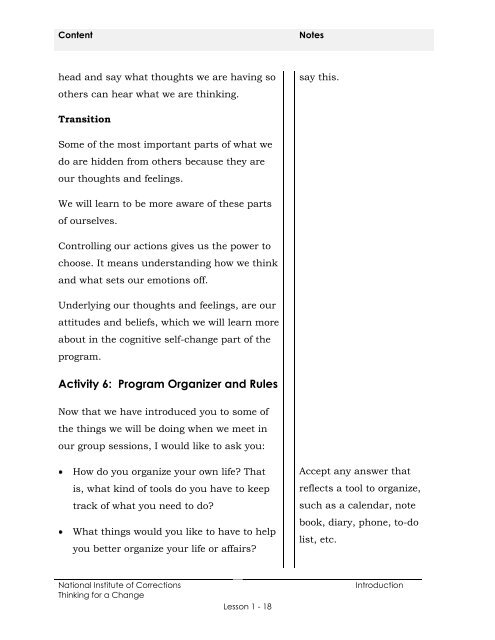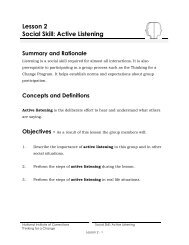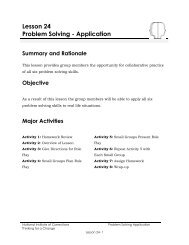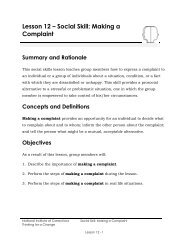- Page 2 and 3: U.S. Department of Justice National
- Page 4 and 5: Copyright © 2011, Jack Bush, Barry
- Page 6: Foreword Over the last six decades,
- Page 9 and 10: practical manner. This was one of N
- Page 11 and 12: The following icons outline when to
- Page 13 and 14: Delivery The curriculum has been re
- Page 15 and 16: Group Norms The program should also
- Page 18: Acknowledgements The authors wish t
- Page 23 and 24: 4. Social Skills are behaviors or a
- Page 25 and 26: Content Notes Activity 1: Introduct
- Page 27 and 28: Content Notes Activity 2: Pocket An
- Page 29 and 30: Content This idea - that thinking c
- Page 31 and 32: Content Notes Discuss Example This
- Page 33 and 34: Content Notes Discuss Example I did
- Page 35 and 36: Content Notes Discuss Example Help
- Page 37: Content mountain. The biggest part
- Page 41 and 42: Content Notes These are some great
- Page 43 and 44: Content Notes schedule. Tell group
- Page 46 and 47: Lesson 2 - Social Skill: Active Lis
- Page 48 and 49: Equipment Supplies Easel (chart sta
- Page 50 and 51: Content Notes Skills are abilities
- Page 52 and 53: Content Notes Activity 2: Overview
- Page 54 and 55: Content Notes that a thinking step
- Page 56 and 57: Content and I must listen to him/he
- Page 58 and 59: Content Notes was that modeled? Wha
- Page 60 and 61: Content Notes can. Remember to poin
- Page 62 and 63: Content Notes To the Co-actor How d
- Page 64 and 65: Content Activity 7: Repeat Activiti
- Page 66: Active Listening 1. Look at the per
- Page 69 and 70: 1. What happened when you did the h
- Page 71 and 72: Major Activities Activity 1: Homewo
- Page 73 and 74: Content Activity 1: Homework Review
- Page 75 and 76: Content Notes Define the Skill Who
- Page 77 and 78: Content was that about? (Answer: It
- Page 79 and 80: Content Notes I have a friend with
- Page 81 and 82: Content Notes (Example answer: He/s
- Page 83 and 84: Content Notes skill. Identify Role
- Page 85 and 86: Content Notes In fact, (group membe
- Page 87 and 88: Content Notes of? Did (main actor)
- Page 89 and 90:
Content Notes Here is a homework sh
- Page 92 and 93:
Name: ________________________ Date
- Page 94 and 95:
Lesson 4 - Social Skill: Giving Fee
- Page 96 and 97:
Equipment Supplies Easel (chart sta
- Page 98 and 99:
Content Notes Tell us another situa
- Page 100 and 101:
Content Notes actually see the pers
- Page 102 and 103:
Content Notes fishing trip this wee
- Page 104 and 105:
Content Notes wanted to provide obj
- Page 106 and 107:
Content lesson. Activity 5: Group M
- Page 108 and 109:
Content Would (group member name) w
- Page 110 and 111:
Content To the Main Actor How well
- Page 112:
Content Notes the second shaded par
- Page 116 and 117:
Name: ________________________ Date
- Page 118 and 119:
Lesson 5 - Social Skill: Knowing Yo
- Page 120 and 121:
Equipment Supplies Easel (chart sta
- Page 122 and 123:
Content Who would like to begin? Ac
- Page 124 and 125:
Content every skill is made up of a
- Page 126 and 127:
Content Notes the mouth. I have a v
- Page 128 and 129:
Content In step 1, did _____ “tun
- Page 130 and 131:
Content Notes do a role play. Remin
- Page 132 and 133:
Content knowing what he/she is feel
- Page 134 and 135:
Content To the Main Actor How well
- Page 136:
Content Notes the one you just role
- Page 140:
Knowing Your Feelings 1. Tune in to
- Page 143 and 144:
1. What happened when you did the h
- Page 145 and 146:
2. Feelings are emotions that go al
- Page 147 and 148:
1. 2. Content Activity 1: Homework
- Page 149 and 150:
Content you have learned before our
- Page 151 and 152:
Content How would you describe the
- Page 153 and 154:
Content Notes think and feel this w
- Page 155 and 156:
Content You can’t trust the polic
- Page 157 and 158:
Content Activity 6: Predict Future
- Page 159 and 160:
Content Notes However, we can learn
- Page 161 and 162:
Content Notes Listed their thoughts
- Page 163 and 164:
Content Notes Disrespected? Since w
- Page 165 and 166:
Content Notes conflict with another
- Page 168 and 169:
Thoughts: 1. 2. 3. 4. 5. 6. 7. 8. 9
- Page 170:
3 Steps of Cognitive Self Change 1.
- Page 173 and 174:
Name: ________________________ Date
- Page 175 and 176:
Objective process means without: bl
- Page 177 and 178:
Supplements Charts - Make before fa
- Page 179 and 180:
Content Notes you to report briefly
- Page 181 and 182:
Content fear, frustration, exciteme
- Page 183 and 184:
Content For Jones Let’s have anot
- Page 185 and 186:
Content good or bad. Look at your t
- Page 187 and 188:
Content Notes Look closely at Jim
- Page 189 and 190:
Content brief, factual sentence or
- Page 191 and 192:
Content Notes stuck. Examples: “D
- Page 193 and 194:
Content Transition Good job. This i
- Page 195 and 196:
Content Very good. Your report look
- Page 197 and 198:
Content Notes authority on how he/s
- Page 199 and 200:
Content You have learned and practi
- Page 202:
Jim’s Thinking Report Situation:
- Page 205 and 206:
Name: ________________________ Date
- Page 207 and 208:
Objectives - As a result of this le
- Page 209 and 210:
Content Activity 1: Homework Review
- Page 211 and 212:
Content Notes Activity 3: Practice
- Page 213 and 214:
Content Feelings leading Jim to bre
- Page 215 and 216:
Content attitudes and beliefs. Ques
- Page 217 and 218:
Content Notes Activity 5: Group Mem
- Page 219 and 220:
Content Part 3 - Feelings Now let
- Page 221 and 222:
Content Notes Feelings Group, do yo
- Page 223 and 224:
Content Notes Let’s look at the k
- Page 225 and 226:
Content Notes thought, feeling, and
- Page 227 and 228:
Content Activity 7: Repeat Activiti
- Page 229 and 230:
Content We will practice step 3 - u
- Page 232 and 233:
Homework Sheet: Lesson 8 Think of a
- Page 234 and 235:
Lesson 9 - Cognitive Self-Change: S
- Page 236 and 237:
Equipment Supplies Easel (chart sta
- Page 238 and 239:
Content Activity 2: Overview of the
- Page 240 and 241:
Content Will I feel okay about myse
- Page 242 and 243:
Content different new thoughts as y
- Page 244 and 245:
Content Notes new way if the new th
- Page 246 and 247:
Content Summary and Transition Good
- Page 248 and 249:
Content Notes quiet while Jim goes
- Page 250 and 251:
Content Notes thoughts, feelings, a
- Page 252 and 253:
Content Now, let’s look at the at
- Page 254 and 255:
Content way, what do you think you
- Page 256 and 257:
Content thinking? If you actually t
- Page 258 and 259:
Content noted when we first introdu
- Page 260 and 261:
Risk Thought: New Thoughts: 1. 2. 3
- Page 262 and 263:
Homework Sheet: Lesson 9 Watch for
- Page 264 and 265:
Lesson 10 - Cognitive Self-Change:
- Page 266 and 267:
Equipment Supplies Easel (chart sta
- Page 268 and 269:
Content A thinking check-in has 4 p
- Page 270 and 271:
Content 3. Now, tell us how your th
- Page 272 and 273:
Content Great job! Who wants to go
- Page 274:
Content Notes for times where you h
- Page 277 and 278:
Name: ________________________ Date
- Page 279 and 280:
Objectives - As a result of this le
- Page 281 and 282:
References Aggression Replacement T
- Page 283 and 284:
Content Notes Activity 2: Overview
- Page 285 and 286:
Content vignette that shows you the
- Page 287 and 288:
Content action step? (Answer: “De
- Page 289 and 290:
Content Notes Be sure to point to y
- Page 291 and 292:
Content Notes In step 1, “Watch t
- Page 293 and 294:
Content situation. With whom will y
- Page 295 and 296:
Content Notes Be sure that the role
- Page 297 and 298:
Content To the Co-actor How did you
- Page 299 and 300:
Content Activity 7: Repeat Activiti
- Page 301 and 302:
Content Notes Remember, the anticip
- Page 304 and 305:
Name: ________________________ Date
- Page 306 and 307:
Lesson 12 - Social Skill: Making a
- Page 308 and 309:
Equipment Supplies Easel (chart sta
- Page 310 and 311:
Content Your homework was to practi
- Page 312 and 313:
Content Notes might be a mutual, ac
- Page 314 and 315:
Content Notes step. (Answer: Tell t
- Page 316 and 317:
Content Notes Activity 4: Discuss M
- Page 318 and 319:
Content Now that you have seen a mo
- Page 320 and 321:
Content To the Co-actor Try to play
- Page 322 and 323:
Content To the Co-actor How did you
- Page 324 and 325:
Content Activity 7: Repeat Activiti
- Page 326:
Making a Complaint 1. Decide what y
- Page 329 and 330:
Describe Your Actions (What you spe
- Page 331 and 332:
Major Activities Activity 1: Homewo
- Page 333 and 334:
Content Activity 1: Homework Review
- Page 335 and 336:
Content Notes Activity 2: Overview
- Page 337 and 338:
Content (Answer: It is called that
- Page 339 and 340:
Content Notes Tell group members to
- Page 341 and 342:
Content What were they? How about s
- Page 343 and 344:
Content Are you standing or sitting
- Page 345 and 346:
Content Activity 6: Discuss Role Pl
- Page 347 and 348:
Content Activity 7: Repeat Activiti
- Page 350:
Apologizing 1. Decide if it would b
- Page 353 and 354:
Describe Your Actions (What you spe
- Page 355 and 356:
Major Activities Activity 1: Homewo
- Page 357 and 358:
Content Activity 1: Homework Review
- Page 359 and 360:
Content Activity 2: Overview of Soc
- Page 361 and 362:
Content What was a thinking step ab
- Page 363 and 364:
Content (Group member name) read st
- Page 365 and 366:
Content Activity 4: Discuss Modelin
- Page 367 and 368:
Content Notes Now that you have see
- Page 369 and 370:
Content To the Co-actor Try to play
- Page 371 and 372:
Content To the Co-actor How did you
- Page 373 and 374:
Content Activity 7: Repeat Activiti
- Page 376:
Responding to Anger 1. Listen to th
- Page 379 and 380:
Describe Your Actions (What you spe
- Page 381 and 382:
Major Activities Activity 1: Homewo
- Page 383 and 384:
Content Activity 1: Homework Review
- Page 385 and 386:
Content Notes Activity 2: Overview
- Page 387 and 388:
Content What are we supposed to do
- Page 389 and 390:
Content if that is a thinking step
- Page 391 and 392:
Content Notes Activity 4: Discuss M
- Page 393 and 394:
Content And step 6, did _____ “su
- Page 395 and 396:
Content Notes Try to play the part
- Page 397 and 398:
Content Notes To the Co-actor How d
- Page 399 and 400:
Content Activity 7: Repeat Activiti
- Page 401 and 402:
Content Notes solving, in the next
- Page 404 and 405:
Name: ________________________ Date
- Page 406 and 407:
Lesson 16 - Introduction to Problem
- Page 408 and 409:
Objective - As a result of this les
- Page 410 and 411:
Content Activity 1: Homework Review
- Page 412 and 413:
Content Notes As we look at the pro
- Page 414 and 415:
Content Notes detention. There is t
- Page 416 and 417:
Content (Example answers: “He can
- Page 418 and 419:
Content what Bender could have done
- Page 420 and 421:
Content Notes Activity 7: Explain P
- Page 422 and 423:
Content Notes throughout this progr
- Page 424 and 425:
Content Activity 9: Explain Skill 3
- Page 426 and 427:
Content Notes affect what they will
- Page 428 and 429:
Content identify which action or ac
- Page 430 and 431:
Content Bender’s face. Step 2:: C
- Page 432 and 433:
Content Evaluate means taking time
- Page 434 and 435:
Content Step 2: Ask Questions There
- Page 436:
Program Organizer What kinds of new
- Page 440:
Step 4: Identify How Will You Do an
- Page 444 and 445:
Homework Sheet: Lesson 16 Watch for
- Page 446 and 447:
Lesson 17 - Problem Solving: Skill
- Page 448 and 449:
Objectives - As a result of this le
- Page 450 and 451:
Equipment Supplies Easel (chart sta
- Page 452 and 453:
Content cycle. Let’s review the c
- Page 454 and 455:
Content Goal and Gather Information
- Page 456 and 457:
Content control of ourselves in the
- Page 458 and 459:
Content (Example answers - head thr
- Page 460 and 461:
Content Let’s hear some of your i
- Page 462 and 463:
Content Notes 2. Get space Another
- Page 464 and 465:
Content Notes Who would like to sha
- Page 466 and 467:
Content Notes 3. Calm Down Problems
- Page 468 and 469:
Content Let’s hear some of your a
- Page 470 and 471:
Content Notes Activity 9: Discuss M
- Page 472 and 473:
Content to do; and she took a deep
- Page 474:
Content Notes Now let me collect th
- Page 478 and 479:
Name: ________________________ Date
- Page 480 and 481:
Homework Sheet: Lesson 17 Name: ___
- Page 482:
Woman’s Problem Situation Script
- Page 485 and 486:
Objectives - As a result of this le
- Page 487 and 488:
Equipment Supplies Easel (chart sta
- Page 489 and 490:
Content my warning signs: physical
- Page 491 and 492:
Content Stating the problem means l
- Page 493 and 494:
Content that we have the most contr
- Page 495 and 496:
Content Notes and we need to use
- Page 497 and 498:
Content Notes Example 1 Here is an
- Page 499 and 500:
Content Activity 8: Model Problem S
- Page 501 and 502:
Content Step 2: Does she describe t
- Page 503 and 504:
Content Notes Problem Solving Skill
- Page 505 and 506:
Content Sherry made a problem state
- Page 507 and 508:
Content Activity 11: Wrap-up Today
- Page 510 and 511:
Reaction to Roster I (think or feel
- Page 512:
Step 1: Stop Physical Reactions: Ri
- Page 516:
National Institute of Corrections S
- Page 519 and 520:
Step 2: Think - Reduce your risk 1.
- Page 522 and 523:
Modeling Display - Shewan and Ms. S
- Page 524 and 525:
Modeling Display - Sherry and Ms. P
- Page 526 and 527:
Lesson 19 - Problem Solving: Skill
- Page 528 and 529:
Supplements Charts - Make before fa
- Page 530 and 531:
Content Activity 1: Homework Review
- Page 532 and 533:
Content Notes think ahead to set a
- Page 534 and 535:
Content nasty rumors about you. A p
- Page 536 and 537:
Content Notes of this place right n
- Page 538 and 539:
Content Notes so that when I make s
- Page 540 and 541:
Content (Example answer: The person
- Page 542 and 543:
Content What other thoughts do you
- Page 544 and 545:
Content Notes (and why)? discussion
- Page 546:
Skill 3: Set a Goal and Gather Info
- Page 550:
National Institute of Corrections S
- Page 553 and 554:
Step 2: Think - Reduce your risk 1.
- Page 555 and 556:
Problem Solving Skill 3: Set a Goal
- Page 557 and 558:
*Supplements Charts - Make before f
- Page 559 and 560:
Content Notes face’ or ‘time to
- Page 561 and 562:
Content Notes What do you guess the
- Page 563 and 564:
Content Notes reactions, risk thoug
- Page 565 and 566:
Content heard and how it fits into
- Page 567 and 568:
Content Notes Individual Practice o
- Page 569 and 570:
Content Individual Practice of Skil
- Page 571 and 572:
Content Notes state the problem and
- Page 574 and 575:
Problem Solving Skills 1, 2, and 3
- Page 576:
Problem Solving Skill 3: Set a Goal
- Page 579 and 580:
Provide background information Intr
- Page 582 and 583:
Prepare 2 actors: Student and frien
- Page 584 and 585:
Continue modeling display Skill 2:
- Page 586 and 587:
Lesson 21 - Problem Solving: Skill
- Page 588 and 589:
Major Activities Activity 1: Review
- Page 590 and 591:
Content Activity 1: Review of First
- Page 592 and 593:
Content Here is a skill card with t
- Page 594 and 595:
Content Notes Considering each of t
- Page 596 and 597:
Content Now let’s do step 1 of pr
- Page 598 and 599:
Content Step 2: Think About Consequ
- Page 600 and 601:
Content We will go through a proces
- Page 602:
Content Notes (Example answers: If
- Page 606:
National Institute of Corrections T
- Page 610 and 611:
Lesson 22 - Problem Solving: Skill
- Page 612 and 613:
Equipment Supplies Easel (chart sta
- Page 614 and 615:
Content (Answer: Think of choices a
- Page 616 and 617:
Content Now, each of you will have
- Page 618 and 619:
Content Activity 3: Overview of Les
- Page 620 and 621:
Content Step 4: Identify How You Wi
- Page 622 and 623:
Content 3 chart.) What are some of
- Page 624 and 625:
Content What tone of voice can help
- Page 626 and 627:
Name: ________________________ My g
- Page 628:
National Institute of Corrections M
- Page 631 and 632:
Step 2: Choose key social skills th
- Page 633 and 634:
Major Activities Activity 1: Homewo
- Page 635 and 636:
Content Notes Activity 1: Homework
- Page 637 and 638:
Content Notes Key Question 1: Am I
- Page 639 and 640:
Content Notes Here is a skill card
- Page 641 and 642:
Content Notes Step 2: Ask Questions
- Page 643 and 644:
Content Notes Meet with a partner a
- Page 645 and 646:
Content Notes What did you see the
- Page 647 and 648:
Content Notes all six skills of pro
- Page 650 and 651:
Homework Sheet: Lesson 23 Between n
- Page 652:
Name: ________________________ Date
- Page 655 and 656:
Supplements Charts - Make before fa
- Page 657 and 658:
Content Notes The role play needs t
- Page 659 and 660:
Content Activity 5: Small Group Pre
- Page 661 and 662:
Content Notes Problem Solving Skill
- Page 663 and 664:
Content Notes Activity 6: Repeat Ac
- Page 665 and 666:
Content Small Group Discussion We a
- Page 668 and 669:
All 6 Problem Solving Skills - Role
- Page 670 and 671:
All 6 Problem Solving Skills - Role
- Page 672 and 673:
Problem Solving Skill 3: Set a Goal
- Page 674 and 675:
Problem Solving Skill 5: Make a Pla
- Page 676:
Homework Sheet: Lesson 24 Between n
- Page 679 and 680:
4. What thoughts do you have about
- Page 681 and 682:
Supplements Charts - Make before fa
- Page 683 and 684:
Content Activity 3: Celebration Tod
- Page 685 and 686:
Content Notes Option 1 (facilitator
- Page 687 and 688:
Content Notes your social skills ar
- Page 690 and 691:
Cognitive Self-Change Aftercare Sum
- Page 692 and 693:
Content Activity 1 : Homework Revie
- Page 694 and 695:
Content Who would like to begin? 1.
- Page 696 and 697:
Content situation. Imagine how you
- Page 698:
Content Notes Step 1: Pay attention
- Page 701 and 702:
Name: ________________________ Date
- Page 703 and 704:
Major Activities Activity 1: Overvi
- Page 705 and 706:
Content Activity 1: Homework Review
- Page 707 and 708:
Content Skill Step Identification W
- Page 709 and 710:
Content Activity 3: Discuss Modelin
- Page 711 and 712:
Content Notes before the next sessi
- Page 713 and 714:
Content Notes Try to play the part
- Page 715 and 716:
Content Notes Did (main actor) do t
- Page 717 and 718:
Content Activity 7: Homework Now th
- Page 720 and 721:
Name: ________________________ Date
- Page 722 and 723:
Fifty Social Skills that Can be Use
- Page 724 and 725:
Fifty Social Skills that Can be Use
- Page 726 and 727:
Fifty Social Skills that Can be Use
- Page 728:
Fifty Social Skills that Can be Use
- Page 731 and 732:
Supplements Charts - Make before fa
- Page 733 and 734:
Content Calm down Activity 2: Indiv
- Page 735 and 736:
Content Step 3: Pick a choice to ge
- Page 737 and 738:
Content Notes members. Who wants to
- Page 739 and 740:
Content co-actor? Discussion of Rol
- Page 741 and 742:
Content Notes The group facilitator
- Page 745:
U.S. Department of Justice National





